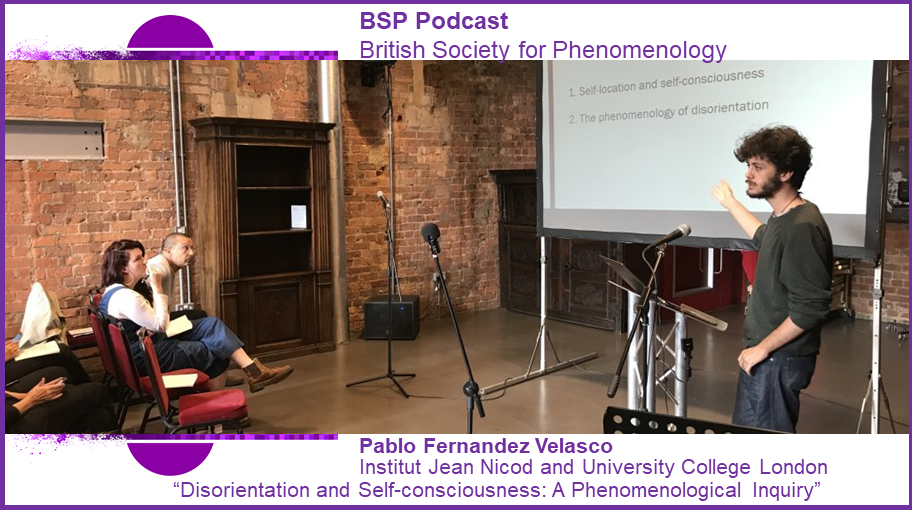This episode of our podcast continues with another presentation from the BSP 2019 annual conference held in Manchester last summer.
Season 4 episode 82: 18 July 2020
Season four of the BSP Podcast continues with a paper from Pablo Fernandez Velasco, Institut Jean Nicod, Département d’études cognitives, ENS, EHESS, CNRS, PSL; and University College London. The recording is taken from our 2019 Annual Conference, ‘The Theory and Practice of Phenomenology’.
Pablo Fernandez Velasco: ‘Disorientation and Self-consciousness: A Phenomenological Inquiry’
You can listen to this episode on the BSP’s Podbean site, and you can also find it on iTunes and all good podcasting apps by searching ‘BSP Podcast’.
ABSTRACT: The present paper explores the phenomenology of disorientation and its relationship with self-consciousness. Section 1 discusses previous literature on the links between self-location and self-consciousness and proposes a distinction between minimal self-location (which requires only an ego-centric frame of reference) and integrated self-location (which requires the integration of egocentric and allocentric frames of reference). The double aim of the paper is, on the one hand, to use this distinction (between minimal and integrated self-location) to deepen our understanding of spatial disorientation and, on the other, to use the phenomenology of disorientation to elucidate the role that self-location plays in shaping self-consciousness. Section 2 starts by looking at the experience of being “turned around”, which is a common experience of disorientation, and then expands to disorientation episodes related to the other two egocentric axes: experiences of being “left-right reversed”, and of being “turned upside-down”. This leads to the conclusion that integrated self-location is transmodal and depends on all three egocentric axes, and that disorientation destabilizes this integrated self-location. Section 3 explores a corpus of reports of disorientation episodes and highlights four key characteristics of these experiences (anxiety, vulnerability, confusion and diminishment) and their links to self-consciousness, focusing on the transformations in both the lived body and the experience of space. This phenomenological analysis reveals that during disorientation, the body-space shrinks, and the horizon of experience becomes more uncertain, leading to anxiety and a feeling of unfamiliarity. The central thesis of this paper is that during disorientation a destabilization of integrated self-location results in a diminished form of self-consciousness. Section 4 concludes with a summary of the key points of the paper and points to future directions of research.

BIO: The central aim of my current research is to explore the varieties and different dimensions of disorientation from the subjective side, in order to produce a characterisation of the phenomenon that is compatible with both empirical data and data about the subjective experience of disorientation, and to use disorientation as a vantage point to understand some of the complexities of spatial cognition and of the human mind at large.
The ‘British Society for Phenomenology Annual Conference 2019 – the Theory and Practice of Phenomenology’ was held at the International Anthony Burgess Foundation, Manchester, UK, 5 – 7 September, 2019.
Registration is now open for our 2020 annual conference: ‘Engaged Phenomenology’’ – the BSP Annual Conference, with the University of Exeter, co-sponsored by Egenis and the Wellcome Centre for Cultures and Environments of Health. Thursday 3 – Saturday 5 September 2020 (post-event access open until 13 Sept). Free to members of the BSP. Membership £40 waged and £20 unwaged / student / emeritus. When you become a member, you receive paper copies of the Journal of the British Society for Phenomenology (four issues a year), plus access to over 50 years of the JBSP Online. Find out more.
The British Society for Phenomenology is a not-for-profit organisation set up with the intention of promoting research and awareness in the field of Phenomenology and other cognate arms of philosophical thought. Currently, the society accomplishes these aims through its journal, events, and podcast. Why not find out more, join the society, and subscribe to our journal the JBSP?

